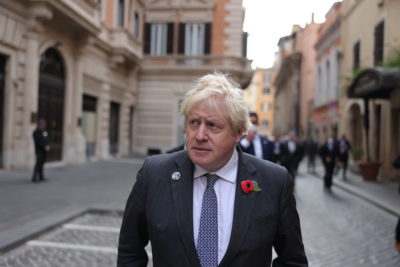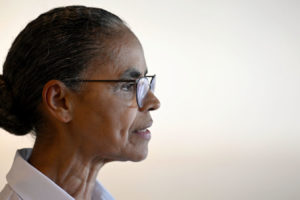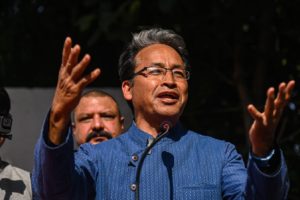British Prime Minister Boris Johnson in Rome for the G20 summit, before heading to the UN climate conference. Andrew Parsons / No 10 Downing Street via Flickr
Some big international conferences begin with high ambition and end in ignominious failure. Some start with modest ambition and achieve major success. It’s too early to tell how the UN climate conference in Glasgow will go. Yet as the biggest climate negotiations since the Paris Agreement in 2015 began Monday in Scotland, the British hosts were making strikingly downbeat assessments of its chances of achieving further progress on taming climate change.
British Prime Minister Boris Johnson, in Rome for the G20 summit over the weekend, rated its chance of success at six out of 10. He called national commitments on cutting emissions so far “drops in a rapidly warming ocean.”
The leaders of China and Russia — which have both historically emitted more CO2 into the atmosphere than any other nation except the United States — have not shown up in Glasgow. Flying in for the two-day leaders’ summit that opened the Glasgow proceedings Monday, President Joe Biden criticized the two countries for foot-dragging and told Glasgow delegates that “none of us can escape the worst of what’s yet to come if we fail to seize this moment.” But he was in no position to boast of U.S. progress, since his own ambitious clean-energy plans are being held hostage in Congress by one of his own party’s senators.
Impatience was clear, too, from UN officials. “We are not where we need to be,” UN climate negotiations secretary Patricia Espinosa told delegates. National pledges left the world on target for 2030 emissions 16 percent above 2010, rather than 45 percent down, as needed for meeting the goal of limiting warming to 1.5 degrees C, she said. We are instead on track for 2.7 degrees C, or 4.9 degrees F.
“Our addiction to fossil fuels is pushing humanity to the brink,” UN Secretary-General António Guterres told the opening session. “We are digging our own graves.” World Meteorological Organisation (WMO) Secretary-General Petteri Taalas said, “Political statements are important, but so far the real atmosphere has been showing something different.”
Two political issues dominated the Glasgow preliminaries. One was whether China, as the world’s biggest emitter, would up its existing commitment to peaking emissions by 2030 and reaching net-zero emissions by 2060. The other was whether rich nations will honor their decade-old financial pledge to deliver $100 billion a year to help poor nations confronted by climate change they did not cause.
Both issues threaten to derail even modest conference ambitions. Many developing countries on the front line of climate change still side with China. They complain that somewhere between Paris and Glasgow, a global target for net-zero emissions by 2050 had been rewritten as a one-size-fits-all net-zero target for all nations, regardless of their wealth or their contributions to the planet’s current fix. And failures on finance are, agrees conference president Alok Sharma, “a matter of trust” that has to be resolved.
Sharma nonetheless says: “I remain hopeful” about a positive outcome. Opening the event on Sunday, he pointed to important strides since Paris. Countries responsible for 80 percent of global emissions have set net-zero emissions targets for mid-century — enough he believes to limit warming to two degrees Celsius. Sharms could perhaps add India to his list after its prime minister, Narendra Modi, promised at the conference to achieve net-zero emissions by 2070.
Those concerned more about the climate than political grandstanding fear that pledges for net-zero that won’t be redeemed for a generation matter less than practical steps to cut emissions dramatically in the coming decade. So, seeing limited potential for progress at the conference on upping existing national pledges, Sharma says he hopes to find agreement on having a review of all targets in 2023.
Meanwhile, he is placing his faith in delivering progress on some interim goals, which the British sum up as “coal, cars, cash, and trees.” On the first, he says: “I want COP26 to consign coal power to history” by agreeing to cease all coal burning. This would build on a commitment from G20 nations meeting last weekend to end aid and other international finance for coal-fired power stations.
Such ad hoc targets are often pushing at open doors created by advancing technology. And they show that, behind the political infighting at climate conferences, a lot has changed in the world.
For instance, there are no targets for solar energy, yet a global inventory published as the conference opened found that photovoltaic capacity has been growing by more than 40 percent a year for a decade. Recently, India has been expanding its solar capacity fastest. In the same period, China has delivered on a little-noticed promise made at the Copenhagen climate conference in 2009 to reduce carbon emissions per dollar of GDP by 40 percent by 2020.
Few in Paris even mentioned electric vehicles, and yet Sharma hopes Glasgow may agree they will be universal by 2035. He also wants a commitment to ending deforestation and beginning reforestation of the planet.
There are, said Ani Dasgupta, president of the World Resources Institute, “encouraging signs of progress across many sectors, [but] the climate crisis is still outpacing our response.” Taalas at the WMO agreed. “I am slightly optimistic,” he said. “The worst IPCC [Intergovernmental Panel on Climate Change] scenarios of 4 to 5 degrees [C] by the end of the century are not now likely.” But the stakes are rising, too. Scientist who a decade ago called for a cap on warming at two degrees C now insist on the need for 1.5.
As the world’s leaders — excepting Xi Jinping and Vladimir Putin — made their national pitches on day one of the conference, some delegates asked if the big shots were a help or a hindrance. Those with long memories noted the failed Copenhagen conference, when President Obama lined up a stellar cast of world leaders in a side-room to thrash out a deal to keep warming below two degrees.
Ambition was high. Late on the final night, the leaders declared success, unveiling a Copenhagen Accord, and headed for their planes home. But as they departed, their triumph evaporated. The real conference refused to be railroaded. As it broke up in chaos, it agreed only to “take note” of the leaders’ accord, which became an appendix of which little more was ever heard.
In Paris six years later, more savvy organizers kept their leaders away as the deal was done. In Glasgow, leaders have arrived at the start of proceedings, and most will fly out on Tuesday night. Then, the real work will begin.
Does the world’s future depend on events in Glasgow in the next two weeks? Some claim so, in apocalyptic terms. “If we don’t get serious about climate change today, it will be too late for our children to do so tomorrow,” Johnson told a room full of delegates whose average age, he said, was 60 years.
But it was Swedish teenage activist Greta Thunberg — a wide-eyed radical to some, and with no formal place at the proceedings — who struck a more realistic, scientifically literate note. In media interviews on Sunday, she said: “It’s never too late.” Climate change is not an on-off switch. “There is not a point where everything is lost,” she said. “We can always prevent things from getting worse.”
Follow all of e360’s daily coverage of the UN climate summit in Glasgow.



